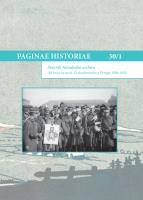Problémy poválečné Evropy. Československo a konference v Janově 1922
Problems of post-war Europe. Czechoslovakia and the Genoa Conference 1922
Author(s): Petr ProkšSubject(s): History, Political history, Interwar Period (1920 - 1939)
Published by: Národní archiv
Keywords: international relations; Genoa Conference (1922); foreign policy
Summary/Abstract: After the First World War and the disintegration of Austria-Hungary, „successor“ states were established in Central Europe: Czechoslovakia, Poland, Yugoslavia, Austria and Hungary, which were located between defeated Germany and Soviet Russia. At the same time, decisions were made on their internal organization and foreign orientation, and the still surviving monarchist and aristocratic conceptions of society clashed with the principles of liberal democracy. At the same time, a radical left-wing communist movement was formed on the one hand and a radically right-wing fascist movement on the other. The post-war development of Central Europe was further affected by the interests of the victorious powers - France, Great Britain and Italy; and the defeated - Germany, and the nationalism of all the „victorious“ and all the "defeated" nations incresaed significantly. At the same time, in the East, Soviet Russia was gradually born hard on the ruins of the tsarist empire in the very complicated conditions of the civil war. All these tendencies permeated each other and created a number of serious problems for the development of post-war Europe, especially social and economic, which the international conference in Genoa tried to solve in 1922. Above all, the involvement of defeated Germany and Soviet Russia in international relations and trade. However, the British and French advocated a tough approach to them. The Germans and Soviets therefore finally concluded their own agreement, thanks to which Soviet Russia broke free from international isolation. At the conference, Czechoslovakia took a prudent approach to both powers. As a result, it continued to maintain fair relations with them. At the same time, it maintained the coherence of the Little Entente and cooperation with the Western Allies.
Journal: Paginae Historiae
- Issue Year: 30/2022
- Issue No: 1
- Page Range: 47-62
- Page Count: 16
- Language: Czech

